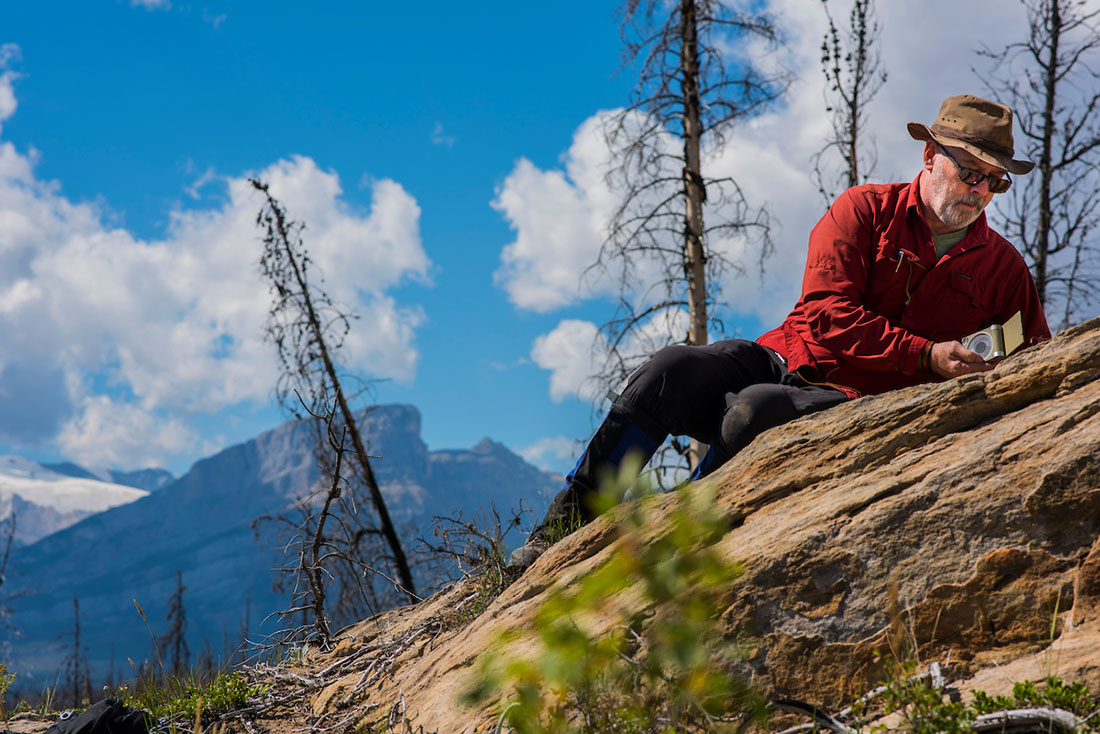
Alumnus Stephen Johnston returns to the U of A as Chair of Earth and Atmospheric Sciences.
The student who literally submitted his PhD thesis on a mountain top has returned home to his alma mater, now as professor and the new chair of the Department of Earth and Atmospheric Sciences. Meet structural geologist Stephen Johnston, MSc '85, PhD '93.
Prior to being wooed back to the University of Alberta, Johnston was professor and director of the School of Earth and Ocean Sciences at the University of Victoria. "I am extremely impressed by the department at the U of A," says Johnston who is optimistic about the direction the department is taking. "Number one, the size impresses me. It's one of the largest and most diverse in the country. With diversity, you can sometimes run the risk that you're a mile wide but an inch deep, but the U of A has developed expertise in a number of fields spanning Earth science. We have some of the world's best isotope geologists, people who've worked on the oldest rocks on Earth, and we've got the world's best experts on things like ichnofossils-worm burrows and soft rock. It's got this incredible diversity."
"We have this great life because of oil and gas, but we can't ignore that we have to do something about climate. I think that if we get our alumni engaged that we can do both." -Stephen Johnston
An accomplished structural geologist, Johnston completed his Master's with Henry Charlesworth-who Johnston calls a great computer math genius-and his PhD with Philippe Erdmer. He recalls the not-so-typical experience of submitting his thesis to the latter. "Philippe flew in on a helicopter to a mountain top in the Dawson Range, I handed him my thesis, and he flew away again."
Johnston worked full time for Shell while he was doing his PhD, and then was one of five geologists hired to found the Yukon Geological Survey in Whitehorse. Following that, he taught at the University of Durban in South Africa prior to heading to the West Coast.
Return to the Rockies
For his part, Johnston is happy to be back in Alberta since he conducts much of his field work in the Rockies. "I do a lot of work using paleomagnetism. Rocks record Earth's magnetic field when they form. By measuring the magnetic field recorded in the rock, we can determine the latitude at which the rocks were deposited. We can use paleomagnetism to show that pretty much all of BC and the Yukon were at the latitude of Mexico 70 million years ago. That's where I think it's really interesting, because it is very difficult to reconcile the paleomagnetic data with our understanding of the Rockies based on the geology . Paleomagnetic data throws everything into question."
To gear up for the 2016/17 school year, Johnston spent some time with some undergraduate students at field school in Nordegg. In danger of becoming a rarity at Canadian universities, field schools are a point of pride for the University of Alberta and also for Johnston who fully supports keeping these important initiatives at the forefront of the undergraduate experience.
"Field schools are tremendously important for a number of reasons. It really builds a family. I think that when you graduate with a degree that's involved multiple field schools, you have this really strong attachment to the department, to your fellow students, and to the people that taught you, because of these incredibly intense, stressful but fabulous experiences. It really feels like a life-changing event for most students. It was for me. I remember feeling at the end of my own first field school that this was going to be my life."
Challenging climate change
Johnston says that if there is a theme that ties the department together, it is climate change, which is both exciting and daunting for the new chair who says that one of his biggest challenges will be talking to the community about climate change. "We have this great life because of oil and gas, but we can't ignore that we have to do something about climate. I think that if we get our alumni engaged that we can do both. We still have to develop and produce hydrocarbons, but we also have to mitigate our environmental footprint. We can't send geologists to Calgary who don't understand the earth's system and who don't understand climate change. People get into geology because they like being outdoors looking at rocks. We don't want to see the environment destroyed. But we have to make sure that we understand at the university level that we have a responsibility to make sure that we produce earth system scientists, not just geologists. They can still be excellent at exploration but they also have to be thinking how to do things in a way that doesn't negatively impact the environment."
There is no doubt that Johnston is up for the challenge. "I'm looking forward to building relationships and finding out how I can best help everyone in the department move ahead. As chair, you gain a sense of satisfaction by seeing a department work well and helping people achieve things. I think I can help people and research groups within the department achieve things they might not otherwise."